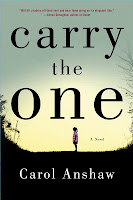Have you ever read a book that vanishes from your memory as
you are reading it? Like dry leaves in the wind, the story and
characters of Carry the One by Carol
Anshaw flew from my mind every single time I closed the book. I would read a
chapter, put it down, pick it up an hour later and—abracadabra—the entire
story had disappeared.
Now, I’m not as young as I used to be (such an interesting
expression—is anyone as young as they used to be, even one minute ago?). And my
memory might not be as strong a muscle as it was back when I was listening
to…what was his name again? The guy with the guitar and the songs…? When I
lived in…where was I living then?
But despite my dwindling powers of retention, I can
generally keep up with who’s who is a novel that I’m reading every single day.
Except for this novel. Everything about it is so uneventful, so dull, so
uninteresting, that it disappeared as if the words were drifting sluggishly off the page. It was insert. Comatose. Dead.
Death is an appropriate metaphor, since the novel is built
around a car accident that causes the death of a ten-year-old girl. It
sounds like such an interesting premise: A carload of celebrants are driving
home a few hours after a joyful wedding. They hit the girl and we follow them
and a few other related characters through the next twenty-five years as they
“carry the one," i.e., live with this horrific shadow over their lives. Historical
events make Forrest Gump-ian appearances, such as the the Take Back the Night
rallies of the 1980s and the attacks of 9/11. There is love, marriage, divorce,
children, triumph, pain, drugs, death, and lots of should-be-hot-but-it’s-not
sex.
Carry the One got
some pretty darn excellent reviews. Entertainment
Weekly said, “If you love Jonathan Franzen, you’ll love this compelling
book.” I hope Franzen sued. In the New York Times, the venerable Michiko Kakutani said the book was, “beautifully
observed…the novel grapples with the many sadnesses of life…with lyricism and
humor. We are pulled along by [Anshaw’s] uncommon ability to describe just
about anything.” I must have missed all that.
But my favorite “review” came from amazon, where one
astute reader said, “My book club chose this book based on a review. It was
unanimous that none of us liked this book. At the end I felt like I had finished a book for a school report just because I had to.”
My book group chose the book, too. And it was also unanimous
that none of us thought very highly of the book. I finished it—because I felt I
had to—and immediately, thankfully, forgot virtually everything about it.


No comments:
Post a Comment